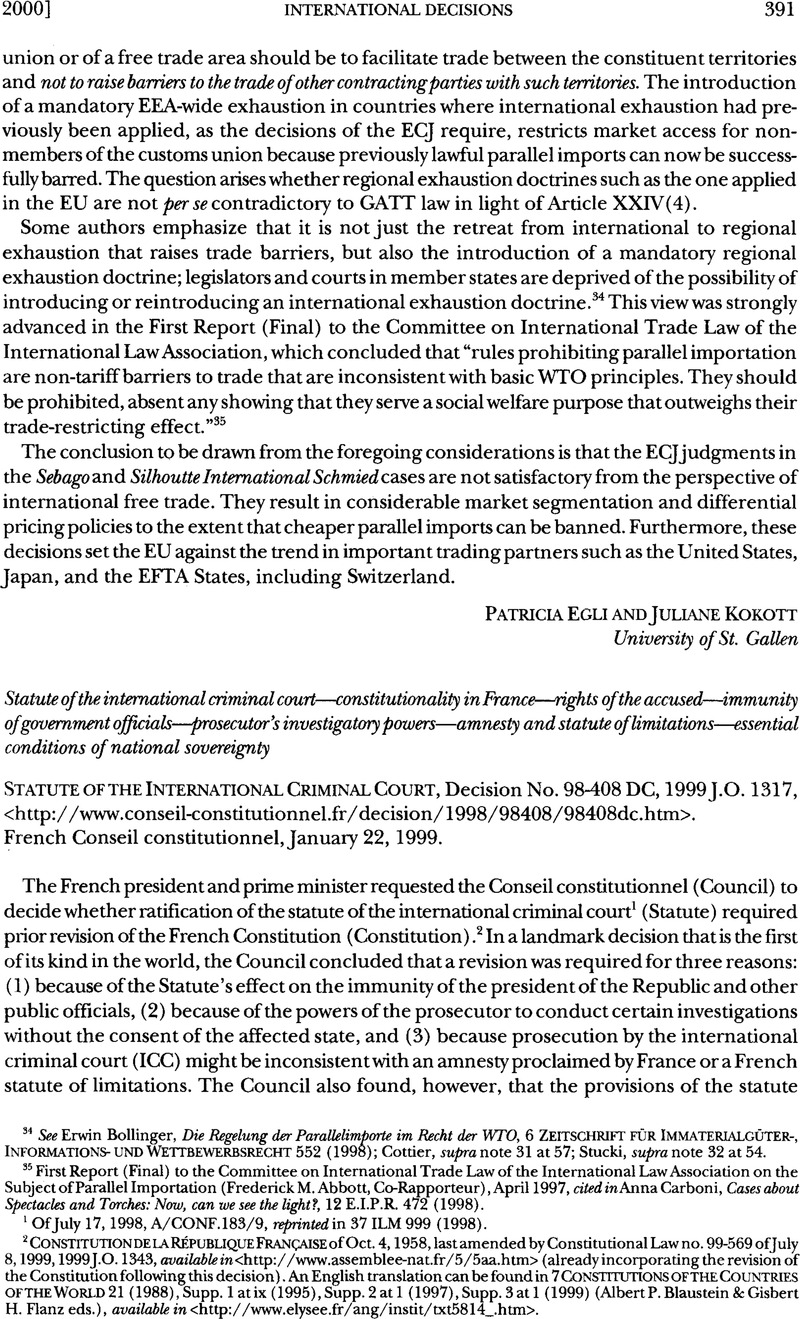Article contents
Statute of the International Criminal Court
Published online by Cambridge University Press: 27 February 2017
Abstract

- Type
- International Decisions
- Information
- Copyright
- Copyright © American Society of International Law 2000
References
1 Of July 17, 1998, A/CONF.183/9, reprinted in 37 ILM 999 (1998).
2 Constitution de la Républioue Française of Oct. 4, 1958, last amended by Constitutional Law no. 99–569 of July 8, 1999, 1999 J.O. 1343, available in <> (already incorporating the revision of the Constitution following this decision). An English translation can be found in 7 Constitutions of the Countries of the World 21 (1988), Supp. 1 at ix (1995), Supp. 2 at 1 (1997), Supp. 3 at 1 (1999) (Albert P. Blaustein & Gisbert H. Flanz eds.), available in <>.
3 Available in <>.
4 This provision reads: “Les traités ou accords regulièrement ratifiés ou approuvés ont, dès leur publication, une autorité supérieure à celle des lois, sous reserve, pour chaque accord ou traité, de son application par l’autre partie” (“Treaties or agreements duly ratified or approved shall, upon publication, prevail over Acts of Parliament, subject, in regard to each agreement or treaty, to its application by the other party”).
5 Constitution, Article 68, supra note 2.
6 According to Article 68 of the Constitution (supra note 2), only the Haute Cour de justice has jurisdiction for such charges against the president. This court comprises an equal number of members of both houses of the legislature, the National Assembly and the Senate (see Article 67 of the Constitution). Article 68-1 of the Constitution provides for the jurisdiction of the Cour de justice de la République for charges against members of the government. This court comprises six members of the National Assembly, six of the Senate, and three of the Gourde cassation (see Article 67 of the Constitution).
7 The constitutional status of the 1789 Declaration and the 1946 Preamble were first affirmed in the Conseil constitutionnel’s Decision no. 71-44 (Freedom of Association), Cons. const., J.O., July 16, 1971, at 7114, available in <>.
8 New Article 53-2, which was inserted by Constitutional Law 99-568 of July 8, 1999 (supra note 2), simply provides: “La République peut reconnaître lajuridiction de la Cour pénale internationale dans les conditions prévues par le traité signé le 18 juillet 1998” (“The Republic may recognize the jurisdiction of the International Criminal Court under the conditions contained in the treaty signed on July 18, 1998”). Article 89 of the Constitution specifies two procedures for amendment: approval by referendum of an amendment passed by both houses of Parliament, or approval by a three-fifths vote of Parliament assembled in Congress of an amendment submitted by the president on the proposal of the prime minister.
9 The French Constitution has been amended twice following decisions of the Conseil constitutionnel in order to permit the ratification of a treaty. See Decision no. 92-308 (Maastricht I), Cons. const., J.O., Apr. 9, 1992, at 5354, available in <>, and Decision no. 97-394 (Treaty of Amsterdam), Cons. const., J.O., Dec. 31, 1997, at 7114, available in <>.
10 Convention on the Prevention and Punishment of the Crime of Genocide, Dec. 9, 1948, 78 UNTS 278 (1948).
11 The Constitution of the 4th French Republic (of Oct. 27, 1946), which was in force at the time of the French ratification of the Genocide Convention in 1950, provided for the immunity of the president and members of government in almost identical terms (Articles 42 and 56), available in <>.
12 See Principle III of the Principles of International Law recognized by the Charter of the International Military Tribunal of Nuremberg and by the judgment of that Tribunal, and adopted by the International Law Commission; Report of the International Law Commission Covering its Second Session 5 June–29 July 1950, UN GAOR, 5th Sess., Supp. No. 12, UN Doc. A/1316, at 11–14 (1950).
13 The reservations reads: “With reference to article IV of the Convention, the Philippine Government cannot sanction any situation which would subject its Head of State, who is not a ruler, to conditions less favorable than those accorded other Heads of State, whether constitutionally responsible rules [sic] or not. The Philippine Government does not consider said article, therefore, as overriding the existing immunities from judicial processes guaranteed certain public officials by the Constitution of the Philippines.” Available in <>.
14 Id. (Australia, Brazil, the Netherlands, Norway, and the United Kingdom).
15 Decision no. 85-188 (6th Additional Protocol to the European Convention on Human Rights), Cons. const., J.O., May 22, 1985, at 5795, available in <>.
16 Decision no. 92-308 (Maastricht I), Cons. const., J.O., Apr. 9, 1992, at 5354, available in <>.
17 See, e.g., the view of the Conseil d’Etat, 46 Rapport Public 343 (1994). The Conseil d’Etat makes an exception in cases where extradition is requested for political reasons, see Jean-Eric Schoetd, Décisions du Conseil constitutionnel, 1999 L’Actualité Jurdique - Droit Administratif 230, 232.
18 See, e.g., the constitutions of Angola (Article 27(1)), Brazil (Article 5 (LI)), Belarus (Article 11(2)), Croatia (Article 9(2)), Estonia (Article 36(2)), Finland (Article 7(3)), Germany (Article 16(2)), Latvia (Article 4 of the Constitutional Law of December 10, 1991), Mongolia (Article 15(2)), Poland (Article 55(1)), Portugal (Article 33(1)), Romania (Article 19(1)), Russia (Article 61(1)), Slovak Republic (Article 23(4)), Slovenia (Article 47), Switzerland (Article 45), Former Socialist Federal Republic of Yugoslavia (Article 17(3)), and Former Yugoslav Republic of Macedonia (Article 4(2)), available in <>.
19 See also François Luchaire, La reserve constitutionnelle de réciprocité, 115 Revue du Droit Public et de la Science Politique en France et à L’Etranger 37, 42 (1999).
- 1
- Cited by




